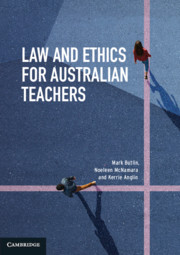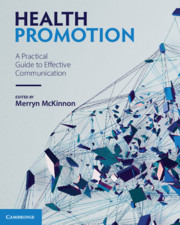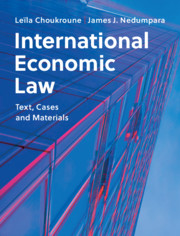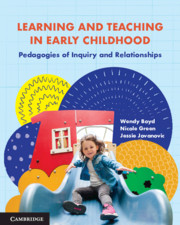Refine search
Actions for selected content:
36807 results in Cambridge Textbooks
Guide to online resources
-
- Book:
- Learning and Teaching in Early Childhood
- Published online:
- 29 July 2021
- Print publication:
- 02 August 2021, pp xv-xvi
-
- Chapter
- Export citation
Chapter 8 - Engaging with families and working in partnership
- from Part 2 - Teaching as relating
-
- Book:
- Learning and Teaching in Early Childhood
- Published online:
- 29 July 2021
- Print publication:
- 02 August 2021, pp 157-181
-
- Chapter
- Export citation
Chapter 10 - Being with and connecting to community
- from Part 2 - Teaching as relating
-
- Book:
- Learning and Teaching in Early Childhood
- Published online:
- 29 July 2021
- Print publication:
- 02 August 2021, pp 204-219
-
- Chapter
- Export citation
Chapter 6 - Advocacy and early childhood policy, curriculum and regulatory requirements
- from Part 1 - Teaching as inquiry
-
- Book:
- Learning and Teaching in Early Childhood
- Published online:
- 29 July 2021
- Print publication:
- 02 August 2021, pp 114-134
-
- Chapter
- Export citation
Acknowledgement of Country
-
- Book:
- Learning and Teaching in Early Childhood
- Published online:
- 29 July 2021
- Print publication:
- 02 August 2021, pp ii-ii
-
- Chapter
- Export citation
Chapter 11 - Sustainability and connecting to nature
- from Part 2 - Teaching as relating
-
- Book:
- Learning and Teaching in Early Childhood
- Published online:
- 29 July 2021
- Print publication:
- 02 August 2021, pp 220-239
-
- Chapter
- Export citation
Preface
-
- Book:
- Learning and Teaching in Early Childhood
- Published online:
- 29 July 2021
- Print publication:
- 02 August 2021, pp xi-xi
-
- Chapter
- Export citation
Part 1 - Teaching as inquiry
-
- Book:
- Learning and Teaching in Early Childhood
- Published online:
- 29 July 2021
- Print publication:
- 02 August 2021, pp 1-134
-
- Chapter
- Export citation
Chapter 4 - Approaches to teaching and learning
- from Part 1 - Teaching as inquiry
-
- Book:
- Learning and Teaching in Early Childhood
- Published online:
- 29 July 2021
- Print publication:
- 02 August 2021, pp 68-89
-
- Chapter
- Export citation
Chapter 9 - Working collaboratively with staff
- from Part 2 - Teaching as relating
-
- Book:
- Learning and Teaching in Early Childhood
- Published online:
- 29 July 2021
- Print publication:
- 02 August 2021, pp 182-203
-
- Chapter
- Export citation
Chapter 12 - Inquiring and relating in the everyday life of an early childhood teacher
- from Part 2 - Teaching as relating
-
- Book:
- Learning and Teaching in Early Childhood
- Published online:
- 29 July 2021
- Print publication:
- 02 August 2021, pp 240-257
-
- Chapter
- Export citation
Part 2 - Teaching as relating
-
- Book:
- Learning and Teaching in Early Childhood
- Published online:
- 29 July 2021
- Print publication:
- 02 August 2021, pp 135-257
-
- Chapter
- Export citation
About the authors
-
- Book:
- Learning and Teaching in Early Childhood
- Published online:
- 29 July 2021
- Print publication:
- 02 August 2021, pp xii-xii
-
- Chapter
- Export citation
Chapter 7 - Fostering meaningful and respectful relationships with children
- from Part 2 - Teaching as relating
-
- Book:
- Learning and Teaching in Early Childhood
- Published online:
- 29 July 2021
- Print publication:
- 02 August 2021, pp 137-156
-
- Chapter
- Export citation
Copyright page
-
- Book:
- Learning and Teaching in Early Childhood
- Published online:
- 29 July 2021
- Print publication:
- 02 August 2021, pp iv-iv
-
- Chapter
- Export citation
Chapter 5 - Agentic documentation and assessment in the 21st century
- from Part 1 - Teaching as inquiry
-
-
- Book:
- Learning and Teaching in Early Childhood
- Published online:
- 29 July 2021
- Print publication:
- 02 August 2021, pp 90-113
-
- Chapter
- Export citation

Law and Ethics for Australian Teachers
-
- Published online:
- 29 July 2021
- Print publication:
- 28 June 2021
-
- Textbook
- Export citation

Health Promotion
- A Practical Guide to Effective Communication
-
- Published online:
- 29 July 2021
- Print publication:
- 25 June 2021
-
- Textbook
- Export citation

International Economic Law
- Text, Cases and Materials
-
- Published online:
- 29 July 2021
- Print publication:
- 22 July 2021
-
- Textbook
- Export citation

Learning and Teaching in Early Childhood
- Pedagogies of Inquiry and Relationships
-
- Published online:
- 29 July 2021
- Print publication:
- 02 August 2021
-
- Textbook
- Export citation
